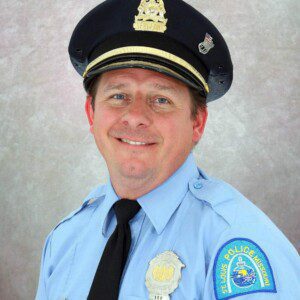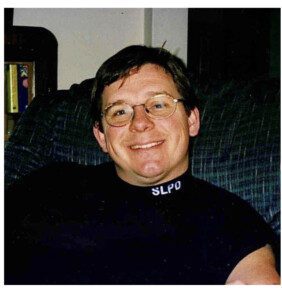
A loving husband to Karen, father to two children and a 29-year veteran of the St. Louis Metropolitan Police Department, Majda was 51 when his body lost its fight to ALS in October 2019.
“He was a good, compassionate, generous and loving person,” Karen says. “Being a police officer can jade a person because you see the worst in humanity, but he chose not to let it impact him that way.”
Tom used his positive outlook on life in acts of kindness, both before and after his ALS diagnosis in September 2017. Prior to his passing, Tom made the decision to donate postmortem tissue to the Washington University School of Medicine, who collected the sample as an addition to Target ALS’ core facilities for scientific research on the disease.
“[Target ALS] was Tom’s choice, because we were much more interested in research than other, broader focuses,” Karen says. “We’ve always wanted the generous community of people with whom we’re connected to make donations primarily for research as opposed to anything else.”
And what a community it was. Part of the reason why Tom made so many close connections throughout his life was that he was so compassionate.
As the Commander of the Prisoner Processing Unit, Tom noticed that the office vending machines were overpriced. His solution? Buy goodies from big box stores and sell them basically at-cost, making the snacks more affordable for his staff.
When that endeavor netted Tom a tidy profit of $300, he used the money to buy a refrigerator and started stocking it with drinks that employees could buy for cheap. And when that profit reached $50, he would order pizza for the entire division.
“After Tom passed, they bought a plaque and attached it to the [snack] cabinet and named it Majda’s Market, which is pretty cool,” Karen adds. “I think that story is a good indicator of the kind of person that Tom was.”
For the longtime police officer, these colleagues and employees were more than just colleagues and employees—they were like family.
Family meant a lot to Tom, which is why he and Karen spearheaded a fundraising effort that raised $100,000 for their niece (Jenny) after she was diagnosed with a terminal case of leukemia. By raising that amount, the family was able to name a grant in her honor that went toward research of her specific form of the disease.
There were many unique and remarkable stories just like that woven into the Majda family fabric, and one of the strongest threads was a shared love of sports. Both Tom and Karen had baseball bloodlines—Tom’s grandfather and uncle worked at the St. Louis Cardinals stadium for decades—and the future husband and wife actually met while working at Busch Stadium.

“He needed a feeding tube—and it was no ifs, ands or buts about it,” Karen says. “They wanted to do it soon, but he said, ‘No, I’m going to watch the Blues win the Stanley Cup first.’”
They did, and he did.
When Tom died that October, his family received a full police escort including interstate closures for cars commuting from the church to the cemetery. It was the type of honor typically bestowed upon an officer who gave their life in the line of duty.
“That was really cool and above and beyond what I had asked for,” Karen adds. “We had a lot of friends and family that were here for the funeral, and the entire process, who were so impressed and moved to tears at that. It spoke volumes as to how high of regard my husband was held within the department.”
Hundreds of people attended the service, including the Chief of Police, who Karen says humbly waited for the chance to pay his respects to his brother in blue and the Majda family.
That’s a memory Karen holds close as it comforts her and reminds her how respected Tom was among his peers. Tom’s been gone for a little more than a year, but Karen often reflects on how ALS never defined her husband—it was just another phase of his journey on this planet.
If he were here, she thinks Tom would want more people with ALS to adopt a positive outlook and make the most of the time they have left. Tom certainly did.
“His advice to someone who was diagnosed would be, ‘You really don’t have many options, so make the best of what you can. Turn lemons into lemonade and look for opportunities to give back so that others in the future may not have the same experience.’”






